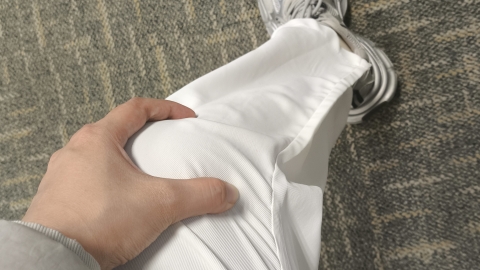What causes leg cramps in teenagers while running?
In general, leg cramps during running in adolescents may be caused by insufficient warm-up before exercise, excessive sweating leading to electrolyte deficiency, hypocalcemia, lower extremity varicose veins, lumbar disc herniation, and other reasons. It is recommended to seek medical attention promptly, identify the underlying cause, and receive symptomatic treatment under a doctor's guidance. Specific analysis is as follows:

1. Insufficient warm-up before exercise: Failure to adequately activate leg muscles before running leaves muscles in a stiff state, making them prone to cramping when suddenly subjected to intense activity. A 5–10 minute warm-up—such as brisk walking or high-knee lifts—should be performed before running to gradually relax the leg muscles and reduce the likelihood of cramps.
2. Excessive sweating and electrolyte loss: Profuse sweating during running leads to loss of essential electrolytes such as sodium and potassium, causing abnormal muscle excitability and resulting in cramps. It is advisable to drink sports beverages containing electrolytes during exercise and consume potassium-rich foods like bananas and oranges afterward to replenish lost electrolytes.
3. Hypocalcemia: Adolescents experience rapid growth and development, and inadequate calcium intake or poor absorption can lead to low blood calcium levels, increasing muscle excitability and predisposing them to cramps during running. Patients may take calcium supplements such as calcium carbonate D3 tablets, calcium gluconate oral solution, or calcium lactate granules as directed by a physician, and increase sun exposure to promote calcium absorption.
4. Lower extremity varicose veins: Abnormal venous valve function impedes blood return, causing insufficient blood supply to leg muscles, which may result in cramps, soreness, and swelling during running. Patients may use medications such as micronized purified flavonoid fraction tablets, diosmin tablets, or calcium dobesilate capsules as prescribed to improve circulation, or wear medical compression stockings to reduce venous pressure.
5. Lumbar disc herniation: Protrusion of the intervertebral disc compresses nerve roots, disrupting neural conduction to the legs. During running, nerve stimulation can trigger leg cramps and pain. Patients may take medications such as ibuprofen sustained-release capsules, mecobalamin tablets, and vitamin B1 tablets as prescribed to relieve pain and support nerve health. In severe cases, percutaneous endoscopic discectomy may be required to relieve nerve compression.
In daily life, adolescents should control the intensity and duration of running, avoiding sudden increases in physical exertion. After exercise, stretching the legs helps relax muscles. Additionally, maintaining a balanced diet with sufficient calcium and electrolytes can help reduce the occurrence of leg cramps.




